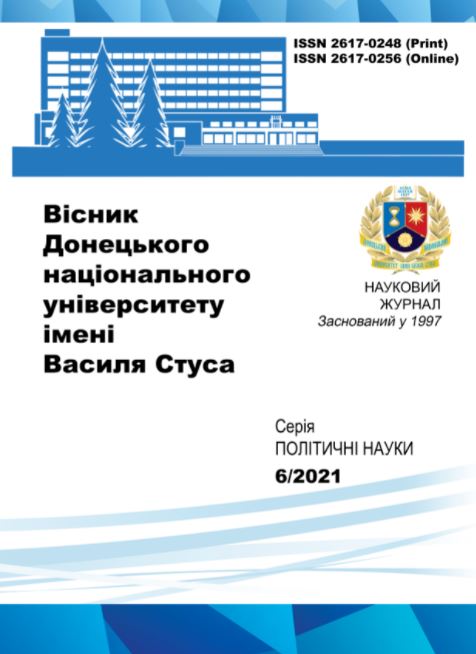Computer Analysis of Ukrainian and Russian Parliamentary Political Parties Communicative Activity
DOI:
https://doi.org/10.31558/2617-0248.2021.6.5Keywords:
political parties; Ukraine; Russia; political emotions; democratization; computer analysis; comparative politicsAbstract
Comparative analysis of Ukrainian and Russian Parliamentary Political Parties Communicative Activity is conducted in the paper. Emotionality and negativity indicators are interpreted. Computer analysis is used for the indicators calculation. News items from official sites of the parties are studied (“Servant of the People”, “Opposition Platform for Life”, “Bat’kivschyna”, “Eurosolidarity”, “United Russia”, “KPRF”, “LDPR”, “A Just Russia”). Is was discovered, that Ukrainian political parties demonstrates higher average indicators of emotionality (18,7%) and negativity (29,7%), that Russian ones (14,5% and 16% respectively). It was concluded, that the results point out to the differences between the political systems: a competitive one (Ukraine) and a controlled one (Russia). As far as Russian parties aren’t demand the government party control, the government itself and other ruling institutions, it’s influence their communication. On the contrary on the Ukrainian parties sites content incudes emotion statements and negativity. Only one Ukrainian party (“Servant of the People”, which formed the majority in the Parliament) had low indicators of emotionality and negativism. It was defined, that the main reason is low need of competition with other party and to criticize the modern government, police and secret services. The research demonstrated a significant attention towards political interactions imitation and leading forms of the imitation. The forms were defined with the more popular political intentions analysis. For the Ukrainian parties the prominent intention is “demand” (with “Servant of the People” as an exception). This is the result of high political struggle and political institutions active interactions. Meanwhile in Russia the intention was used to show the parties members work in the regions, the federal organs weren’t addressed. The same results were achieved with other intentions observation (“decide”, “support”). In majority of cases Russian parties were concentrated on their activity (or “struggle”) promotion in regions or unaddressed demands about social policy. Whereas for Ukrainian parties the current government critics, and (for two parties) Euro Atlantic integration of Ukraine support are significant.
References
Лебедюк В. Конфігурація партійної системи України: нисхідні та висхідні тенденції. Сучасна українська політика. 2013. 28. С. 157–169.
Стеблина Н. Цифровізація політики в контексті трансформації сучасного світопорядку. Одеса: Фенікс, 2020.
Akela C. The Party System In Post-Soviet Russia: a Case Study of the Party United Russia. World Affairs: The Journal of International Issues. 2017. 21(2). С. 34–49.
Caramani D. Comparative Politics. Oxford: Oxford University Press, 2020.
Cianciara A., Zacharuk K. The hidden game of party membership in Ukraine. In Party Members and Their Importance in Non-EU Countries / S. Gherghina, A. Iancu, S. Soare – editors. London: Routledge, 2018.
Evans A. B. The failure of democratization in Russia: A comparative perspective. Journal of Eurasian Studies. 2011. 2. C. 40–51.
Fedorenko K., Rybiy O., Umland A. The Ukrainian Party System before and after the 2013–2014 Euromaidan. Europe-Asia Studies. 2016. 68(4). C. 609–630.
Gel’man V. Party Politics in Russia: From Competition to Hierarchy. In Power and Policy in Putin’s Russia / R. Sakwa – editor. Glasgow: University of Glasgow, 2013. C. 35–52.
Golosov G. Co-optation in the process of dominant party system building: the case of Russia. East European Politics. 2014. 30(2). C. 271–285. doi:10.1080/21599165.2014.899211
Klymenko L. The language of party programmes and billboards. In The Routledge Handbook of Language and Politics / R. Wodak, B. Forchtner – editors. London: Routledge, 2017.
Malfliet K. The Communist Party of the Russian Federation: Not Communist per se. Revue d’études comparatives Est-Oues. 2010. 42(1). C. 37–63.
Matsiyevsky Y. Mixed Values and Societal Constraints: The Weak Prospects for Authoritarianism in Ukraine. Demokratizatsiya: The Journal of Post-Soviet Democratization. 2021. 29(2). C. 135–158.
Molochko P. Pecularities of the development of the Party System of Ukraine: From Pluralism to the Limited Competition. Studia Politologiczne. 2014. 33. C. 209–227.
Nosenko D. Major trends in party system in Ukraine for 1998-2014 years. Granì. 2015. 18(1). C. 125–129.
Nwokora Z., Pelizzo R. Measuring Party System Change: A Systems Perspective. Political Studies. 2017. 66(1).
Oversloot H., Verheul R. Managing democracy: Political parties and the state in Russia. Journal of Communist Studies and Transition Politics. 2006. 22(3). C. 383–405. doi:10.1080/13523270600855795
Roberts S. Converging party systems in Russia and Central Asia: A case of authoritarian norm diffusion? Communist and Post-communist Studies. 2015. C. 146–157.
Rybiy O. Party System Institutionalization in Ukraine. Demokratizatsiya. 2013. 21(3).
Schmitter P. What if Political Parties were to disappear or be abolished? Central European University. URL: https://www.ceu.edu/sites/default/files/attachment/event/7050/real-existing-democracies-withoutpartiespaper.pdf
White S. W., Wyman, M., Kryshtanovskaya, O. Parties and politics in post-communist Russia. Communist and Post-communist Studies. 1995. 28. C. 183–202.
Whitmore S. Political party development in Ukraine. Applied Knowledge Services, 2014.
Wilson K. How Increased Competition Can Strengthen Electoral Authoritarianism. Problems of PostCommunism. 2016. 63(4). C. 199–209. doi:10.1080/10758216.2015.1124744
Yakovlev D., Kroitor, A. Post-election situation in Ukraine: changing faces or ideological transformations? In Contemporary issues of the world community and the role of social sciences in ensuring its development / A. Kroytor, D. Yakovlev, S. Kutsepal, O. Yeremenko – editors. Lviv: Liha-Pres, 2020. C. 1–29.

